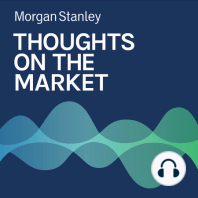4 min listen

Europe: Why is the ECB Increasing their Rate Hikes?
Europe: Why is the ECB Increasing their Rate Hikes?
ratings:
Length:
10 minutes
Released:
Jul 22, 2022
Format:
Podcast episode
Description
This week the European Central Bank surprised economists and investors alike with a higher than anticipated rate hike, so why this hike and what comes next? Chief Cross-Asset Strategist Andrew Sheets and Chief European Economist Jens Eisenschmidt discuss.-----Transcript-----Andrew Sheets: Welcome to Thoughts on the Market. I'm Andrew Sheets, Chief Cross-Asset Strategist for Morgan Stanley. Jens Eisenschmidt: And I'm Jens Eisenschmidt, Morgan Stanley's Chief Europe Economist. Andrew Sheets: And on this special episode of Thoughts on the market will be discussing the recent ECB rate hike and the path ahead. It's Friday, July 22nd at 4 p.m. in London. Andrew Sheets: So, Jens, I want to talk to you about the ECB's big rate decision yesterday. But before we do that, I think we should start by laying the scene of the European economy. In a nutshell, how is Europe's economy doing and what do you think are the most salient points for investors to be aware of? Jens Eisenschmidt: Great question, Andrew. We have revised downwards our growth outlook for the euro area economy on the back of the reduced gas flow coming out from Russia into Germany starting at some point in mid-June. And we are now seeing a mild recession for the euro area economy setting in towards the end of this year and the beginning of next. This is in stark contrast to what the ECB, as early as June, has been saying the euro area economy would look like. I think incoming data, since our call for a bit more muted economic outlook, has been on the negative side. So for instance, we just today had the PMIs in contractionary territory. So the PMIs are the Purchasing Managers Indexes, which are soft indicators of economic activity. Soft because are survey evidence they're essentially questions ask industry participants about what they see on their side, and out of these questions an index is derived for economic activity. So all in all, the outlook is relatively muted, as I said, and I think a recession is clearly in the cards. Andrew Sheets: But Jens, why is growth in Europe so weak? When you think about things like that big decline in PMI that we just saw this week, what's driving that? What do you think is the key thing that maybe other forecasters might be missing in terms of driving this weakness? Jens Eisenschmidt: I mean, Europe is very, very close to one of the largest, geopolitical conflicts of our time. We have, as a consequence of that, to deal with very high energy prices. The dependance on Russian gas, for instance, is very high in several parts of Western Europe. But you're right, we have still accommodative monetary policy, so, all in all, we still have positive and negative factors, but we think that the negative factors are starting now to have the bigger weight in all this. And we have seen for the first time, as you just mentioned to PMI's in contractionary territory, while we are of course having a bit in the service sector, a different picture which is still driven from reopening dynamics coming out from COVID. So everybody wants to have a holiday after they didn't have one last year and the year before. Andrew Sheets: So I guess speaking of holidays, it involves a lot of driving, a lot of flying. I think that's a good segway into the energy story in Europe. This has been a really challenging dynamic because you've had obviously the risk of energy being cut off into Europe. When you think about modeling scenarios of less energy being available via Russia, how do you go about modeling that and what could the impact be? Jens Eisenschmidt: No, that's really the hard part here. Because, ultimately, if the energy is flowing and continues to flow, you can rely on data that goes back and that gives you some relationship between the price and then what the impact on economic activity on that price schedule will be. But if energy is falling to levels where governments have to decide duration, then the modeling becomes so much harder because you have to decide th
Released:
Jul 22, 2022
Format:
Podcast episode
Titles in the series (100)
Andrew Sheets: Fed to the Rescue? Maybe Not. by Thoughts on the Market